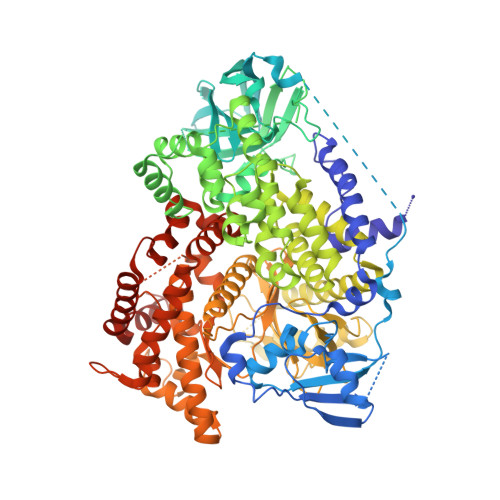Discovery of GSK2126458, a Highly Potent Inhibitor of PI3K and the Mammalian Target of Rapamycin.
Knight, S.D., Adams, N.D., Burgess, J.L., Chaudhari, A.M., Darcy, M.G., Donatelli, C.A., Luengo, J.I., Newlander, K.A., Parrish, C.A., Ridgers, L.H., Sarpong, M.A., Schmidt, S.J., Van Aller, G.S., Carson, J.D., Diamond, M.A., Elkins, P.A., Gardiner, C.M., Garver, E., Gilbert, S.A., Gontarek, R.R., Jackson, J.R., Kershner, K.L., Luo, L., Raha, K., Sherk, C.S., Sung, C.M., Sutton, D., Tummino, P.J., Wegrzyn, R.J., Auger, K.R., Dhanak, D.(2010) ACS Med Chem Lett 1: 39-43
- PubMed: 24900173
- DOI: https://doi.org/10.1021/ml900028r
- Primary Citation of Related Structures:
3L08, 3L54 - PubMed Abstract:
Phosphoinositide 3-kinase α (PI3Kα) is a critical regulator of cell growth and transformation, and its signaling pathway is the most commonly mutated pathway in human cancers. The mammalian target of rapamycin (mTOR), a class IV PI3K protein kinase, is also a central regulator of cell growth, and mTOR inhibitors are believed to augment the antiproliferative efficacy of PI3K/AKT pathway inhibition. 2,4-Difluoro-N-{2-(methyloxy)-5-[4-(4-pyridazinyl)-6-quinolinyl]-3-pyridinyl}benzenesulfonamide (GSK2126458, 1) has been identified as a highly potent, orally bioavailable inhibitor of PI3Kα and mTOR with in vivo activity in both pharmacodynamic and tumor growth efficacy models. Compound 1 is currently being evaluated in human clinical trials for the treatment of cancer.
- GlaxoSmithKline, 1250 South Collegeville Road, Collegeville, Pennsylvania 19426.
Organizational Affiliation:


















